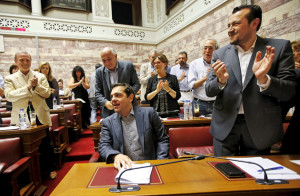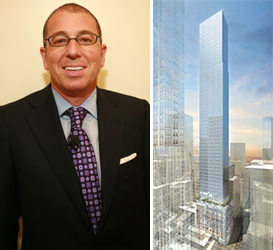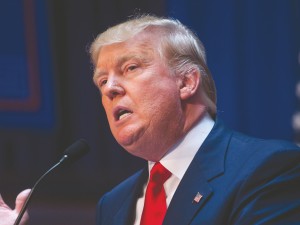Jeff Gural, the New York real estate tycoon, had cleaned up well.
The shaggy, steel-gray beard was gone. The customary khakis had given way to a blue suit. As he sat on a dais on Thursday at the Meadowlands Racetrack he has operated in East Rutherford, N.J., for over two years, a smile spread across his face.
A dozen elected officials were in the room to endorse putting a referendum before voters this fall to expand gambling to northern New Jersey and to support Mr. Gural’s vision for a $1 billion casino at the racetrack. In a surprise, Vincent Prieto, a Democrat who is the State Assembly speaker, also showed up to express his support.
Though he was not at the event, Gov. Chris Christie, a Republican who had once been cool to the idea, has also become a proponent of a casino in the northern part of the state.
Continue reading the main story
RELATED COVERAGE
As Casinos Close in Atlantic City, a Push for More, Closer to New YorkAUG. 18, 2014
Building allies among elected officials and capitalizing on a growing momentum to expand gambling in New Jersey, Mr. Gural is seeking to edge closer to what has long been a tantalizing goal: a gambling site just a few miles from New York City.
Photo
A rendering of the Hard Rock International, a casino proposed for the Meadowlands Racetrack. Credit Zimmerman Architects
His pitch: With over 14 million adults within 50 miles of the racetrack, Mr. Gural and his partner, the Hard Rock, estimate that their proposed Hard Rock Casino could generate $400 million a year in tax revenues; half of that would go toward reviving Atlantic City, where four casinos closed last year.
“It’s a spectacular project,” Mr. Gural said.
It must still overcome opposition from Atlantic City and lawmakers in South Jersey and win a statewide referendum. But the battle over the future of gambling in New Jersey has placed Mr. Gural, 73, at the nexus of a fierce tristate gambling war in which Pennsylvania casinos have sucked the life out of Atlantic City; the only casino in New York City is a runaway success; and a $1 billion casino resort in the Catskills is being built to grab patrons from North Jersey as well as New York and Pennsylvania.
Mr. Gural has essentially sat down at the regional blackjack table to play three simultaneous hands. Not only is he bidding for a casino at the Meadowlands Racetrack, seven miles west of Manhattan, but he will also soon submit a bid for a full-scale casino in Nichols, N.Y., near the northern border of Pennsylvania.
Then there is his pat hand: Mr. Gural and his partners own the land underneath the Sands Casino Resort in Bethlehem, one of Pennsylvania’s most successful casinos.
And he does not even like casino gambling.
It is really all about his lifelong love of horses, he said.
“Saving the horse industry is just as important as saving Atlantic City,” said Mr. Gural, who owns farms in Stanfordville, N.Y., and Litchfield, Pa., where he raises as many as 80 Standardbred horses. “There was no way that horse racing could succeed in New York, or ultimately New Jersey, without it being subsidized by another form of gambling.”
Until recently, Mr. Gural’s day job was running a major commercial real estate company, Newmark Grubb Knight Frank, and overseeing a family portfolio of about 40 buildings.
A few years ago, he sold the family firm, although he remains at Newmark as chairman.
His love of horses and horse racing began in high school, growing up in Woodmere, on Long Island, about a half-mile from Roosevelt Raceway, a now defunct harness track. “We’d go for the last race at night — it was free,” he said. “We’d bet one race and go home.”
Jeff Gural, the New York real estate tycoon, had cleaned up well.
The shaggy, steel-gray beard was gone. The customary khakis had given way to a blue suit. As he sat on a dais on Thursday at the Meadowlands Racetrack he has operated in East Rutherford, N.J., for over two years, a smile spread across his face.
A dozen elected officials were in the room to endorse putting a referendum before voters this fall to expand gambling to northern New Jersey and to support Mr. Gural’s vision for a $1 billion casino at the racetrack. In a surprise, Vincent Prieto, a Democrat who is the State Assembly speaker, also showed up to express his support.
Though he was not at the event, Gov. Chris Christie, a Republican who had once been cool to the idea, has also become a proponent of a casino in the northern part of the state.
RELATED COVERAGE
As Casinos Close in Atlantic City, a Push for More, Closer to New YorkAUG. 18, 2014
Building allies among elected officials and capitalizing on a growing momentum to expand gambling in New Jersey, Mr. Gural is seeking to edge closer to what has long been a tantalizing goal: a gambling site just a few miles from New York City.
Photo
A rendering of the Hard Rock International, a casino proposed for the Meadowlands Racetrack. Credit Zimmerman Architects
His pitch: With over 14 million adults within 50 miles of the racetrack, Mr. Gural and his partner, the Hard Rock, estimate that their proposed Hard Rock Casino could generate $400 million a year in tax revenues; half of that would go toward reviving Atlantic City, where four casinos closed last year.
“It’s a spectacular project,” Mr. Gural said.
It must still overcome opposition from Atlantic City and lawmakers in South Jersey and win a statewide referendum. But the battle over the future of gambling in New Jersey has placed Mr. Gural, 73, at the nexus of a fierce tristate gambling war in which Pennsylvania casinos have sucked the life out of Atlantic City; the only casino in New York City is a runaway success; and a $1 billion casino resort in the Catskills is being built to grab patrons from North Jersey as well as New York and Pennsylvania.
Mr. Gural has essentially sat down at the regional blackjack table to play three simultaneous hands. Not only is he bidding for a casino at the Meadowlands Racetrack, seven miles west of Manhattan, but he will also soon submit a bid for a full-scale casino in Nichols, N.Y., near the northern border of Pennsylvania.
Then there is his pat hand: Mr. Gural and his partners own the land underneath the Sands Casino Resort in Bethlehem, one of Pennsylvania’s most successful casinos.
And he does not even like casino gambling.
It is really all about his lifelong love of horses, he said.
“Saving the horse industry is just as important as saving Atlantic City,” said Mr. Gural, who owns farms in Stanfordville, N.Y., and Litchfield, Pa., where he raises as many as 80 Standardbred horses. “There was no way that horse racing could succeed in New York, or ultimately New Jersey, without it being subsidized by another form of gambling.”
Until recently, Mr. Gural’s day job was running a major commercial real estate company, Newmark Grubb Knight Frank, and overseeing a family portfolio of about 40 buildings.
A few years ago, he sold the family firm, although he remains at Newmark as chairman.
His love of horses and horse racing began in high school, growing up in Woodmere, on Long Island, about a half-mile from Roosevelt Raceway, a now defunct harness track. “We’d go for the last race at night — it was free,” he said. “We’d bet one race and go home.”
Mr. Gural worked with his father, Aaron, in the real estate business. In 1978, he and his friend Barry M. Gosin, Newmark’s chief executive, bought out Mr. Gural’s father.
Mr. Gural, who lives in the El Dorado on the Upper West Side of Manhattan, earned a reputation as a rare liberal Democrat in the real estate industry and as a “soft touch” for charities.
“He’s a mark for any charity, if it’s a worthwhile cause,” Mr. Gosin said. “He likes money to pay the bills, but he’s never been motivated by money.”
After New York State started allowing racetracks to install electronic slot machines, Mr. Gural bought and reopened two bankrupt harness tracks — Tioga Downs and Vernon Downs in central New York, both of which have slot machines. Mr. Gural said the tracks employed hundreds of people in one of the most depressed parts of the state and had generated over $300 million for public education.
In 2012, Mr. Gural signed a deal with Governor Christie to operate the Meadowlands Racetrack, after the state decided to cease subsidizing the state-owned complex, a victim of the decline in the popularity of horse racing.
He lined up partners — Hard Rock owns a one-sixth stake — and built a $120 million grandstand.
Judging from a recent Saturday night, the Meadowlands, which features a large sports bar and several restaurants, attracts younger patrons than can be found at Aqueduct Racetrack in Queens, whose slot-machine parlor has been hugely successful.
But if Mr. Gural is not motivated by money, he also does not want to preside over failing tracks in New York and New Jersey. The betting was that the slot parlors at New York tracks and the Meadowlands would eventually house full-scale casinos.
“I would not have done the Meadowlands if I didn’t think — it’s common sense — that there’d be a casino,” he said.
But until recently, Governor Christie preferred to focus on reviving Atlantic City, where gambling revenues have fallen by half from their $5.2 billion peak in 2006. Alex Bumazhny, a casino analyst at Fitch Ratings, predicts at least two more of the eight remaining casinos there will close.
The problem for the gambling industry is that there are too many casinos chasing too few gamblers — the Northeast, in particular, is considered saturated, with more casinos on the way.
Still, Mr. Bumazhny is far more optimistic about the prospects for a casino in the Meadowlands, or in Jersey City, where a businessman, Paul Fireman, has proposed a $4 billion casino resort with a 95-story tower and 14 restaurants next to a golf course he owns.
“It’s probably one of the better locations in the United States,” he said.
In an attempt to woo support from Atlantic City and South Jersey, Mr. Gural has proposed a 55 percent tax rate on gambling revenues from the proposed Meadowlands project, half of which would be funneled to noncasino projects in Atlantic City. Governor Christie now favors casinos in North Jersey as long as new tax revenues are used to help Atlantic City.
Mr. Gural, Mr. Fireman, the governor and many North Jersey politicians and business leaders are pressing for a referendum on gambling in North Jersey this November. To make that happen, the Legislature must vote on scheduling a referendum before Aug. 3.
But that prospect faces a difficult hurdle: Stephen M. Sweeney, the president of the State Senate who is from South Jersey. Senator Sweeney, a Democrat and a probable candidate for governor, has tried to walk a fine line, saying a casino question should be put off until 2016 when there would be higher voter turnout.
That, however, would put it in the middle of a presidential campaign, when it would be harder and far more expensive to promote an expanded gambling message to voters, Mr. Gural said. He added that he and James Allen, the chairman of Hard Rock, were ready to spend as much as $20 million on an advertising campaign.
“This is not a fight between North Jersey and South Jersey,” Mr. Gural said. “This is about what’s good for the state of New Jersey.”
A version of this article appears in print on June 6, 2015, on page A14 of the New York edition with the headline: Real Estate Magnate Pushes for a Casino in North Jersey. Order Reprints| Today’s Paper|Subscribe







